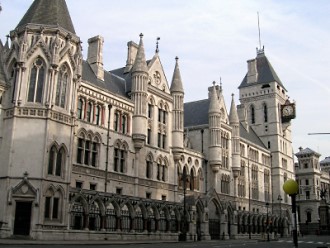Mr Justice Blake ruled yesterday in the High Court that rule 13 of the Tribunal Procedure (First-Tier Tribunal) (Immigration and Asylum Chamber) Rules 2014 was not unlawful following a legal challenge by the Immigration Law Practitioners Association (ILPA).
 Image credit: WikipediaEIN members can read the judgment in Immigration Law Practitioners Association, R (On the Application Of) v Tribunal Procedure Committee & Anor [2016] EWHC 218 (Admin) here.
Image credit: WikipediaEIN members can read the judgment in Immigration Law Practitioners Association, R (On the Application Of) v Tribunal Procedure Committee & Anor [2016] EWHC 218 (Admin) here.
The Law Society Gazette covered the case in an article today here.
As the judgment noted, rule 13(2) of the 2014 Procedure Rules permits the Tribunal to give a direction prohibiting the disclosure of a document or information to a person (including the appellant) if satisfied that such disclosure would be likely to cause that person or some other person serious harm and the Tribunal is satisfied having regard to the interests of justice that it is proportionate to give such a direction.
ILPA had challenged the legality of rule 13, asserting that it was ultra vires as it is beyond the scope of the rule making power in that it interferes with common law principles of fairness without statutory authority.
According to the Law Society Gazette, ILPA argued that rule 13(2) created closed material procedures (or secret trials) which would 'enormously disadvantage' the appellant.
Mr Justice Blake found, however, that the Tribunal Procedure Committee did have the authority to make the rule and that the rules do not give a mandate to a judge to authorise a secret trial, though he said the very existence of the power is troubling.
"In short, I cannot consider that rule 13(2) gives rise to a systemic or inherent lack of fairness since I cannot envisage it will be used to make a closed substantive decision in the manner contended for by the claimant. An occasion of a rule 13 direction being made in the absence of an appellant and advocate cited in the claimant's bundle is obscure as to what kind of direction was made. In any event, if I am wrong as a matter of general prediction, then it is, at least, likely to be such a rare and unusual case, where the competing considerations would have to be examined on their individual facts. The possibility of error in the exercise of judicial discretion could not, in such circumstances, be said to meet the threshold set by the principles set out by the Master of the Rolls in [Lord Chancellor v Detention Action [2015] EWCA Civ 840]," Blake stated in the judgment.
He continued: "I recognise that the very existence of the power is troubling and the repeal of rule 51 (7) equally so. It may well be that this is an issue that the Chamber President or the Senior President of Tribunals will want to consider issuing guidance on."
Ronan Toal, a trustee of ILPA and barrister at Garden Court Chambers, told the Law Society Gazette: "Our challenge did not succeed, but the terms of the judgment take the sting out of that. While it is held that the rule can be applied in a lawful manner, this does not include its being applied in any of the ways we had contended were unlawful. The challenge has thus achieved a helpful clarification."